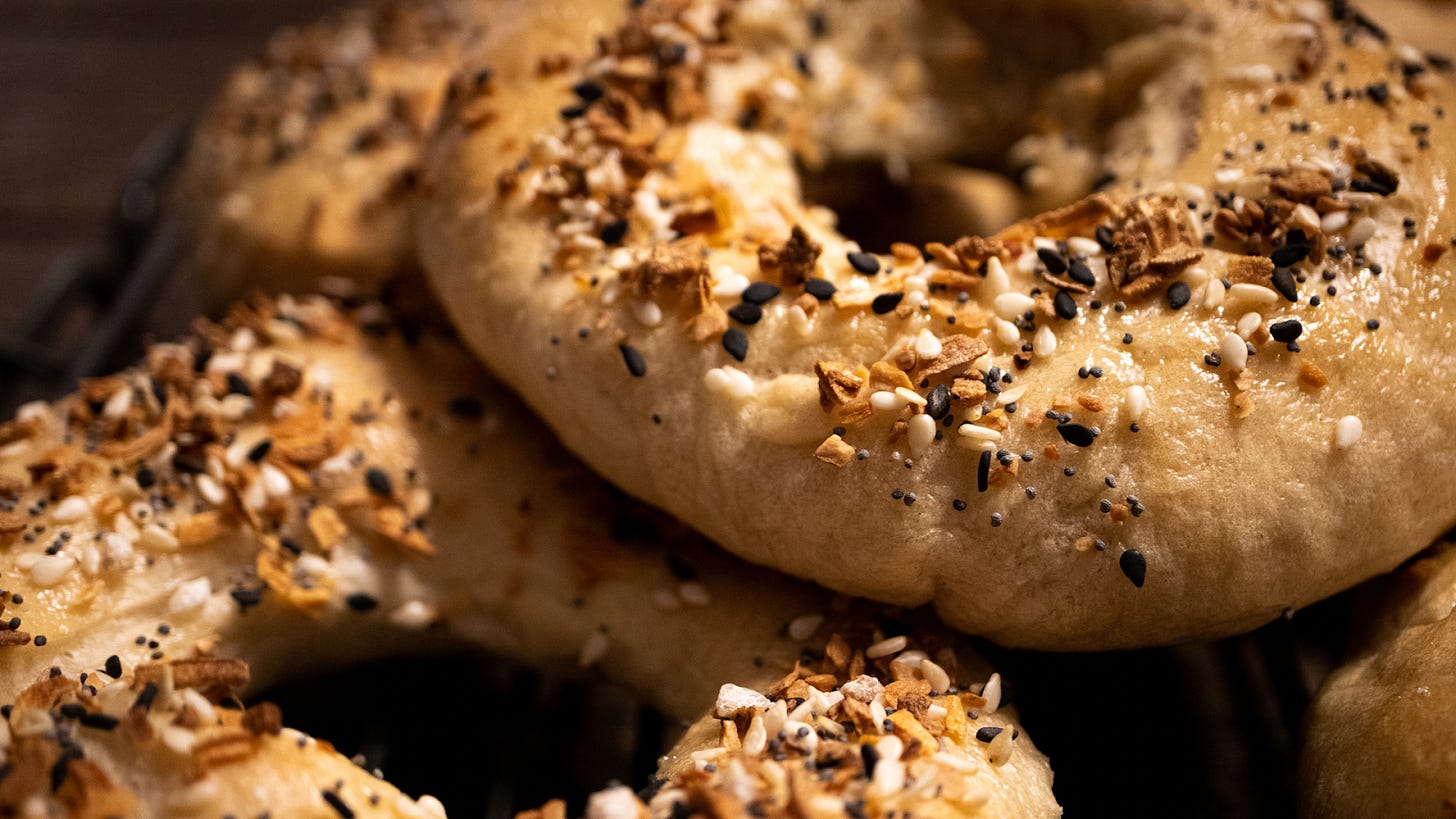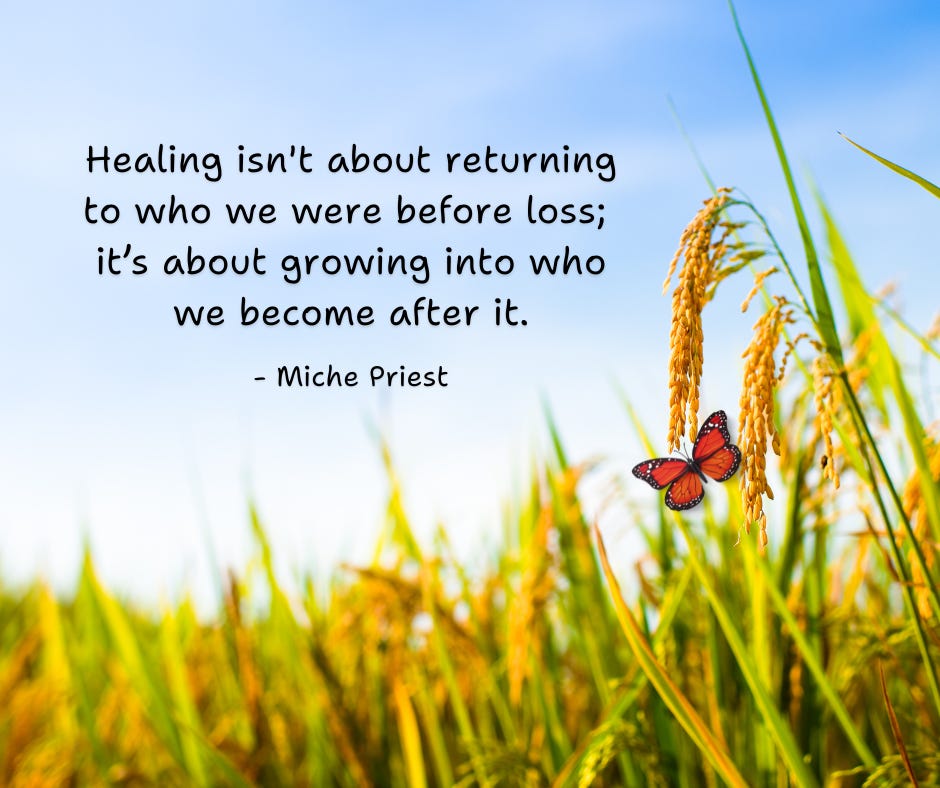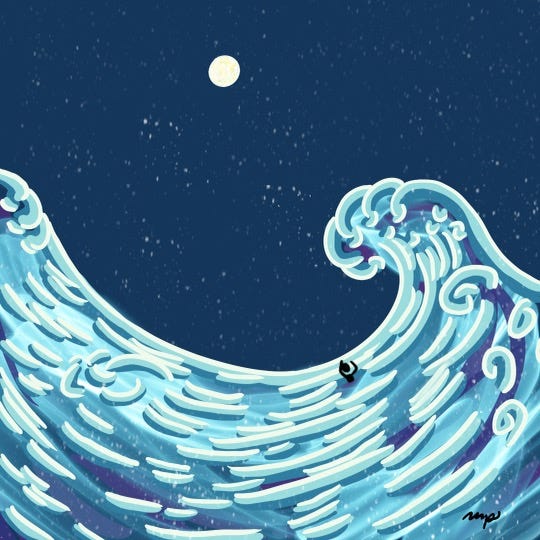Everything Bagel: A Glimpse into Complicated Grief
Trigger WARNING: Topic of suicide bereavement
Trigger WARNING: Topic of suicide bereavement. Content may be disturbing or upsetting.
Author’s Note
Thank you for taking the time to come read my essay. Writing it was a challenging and cathartic experience, and deciding to share it publicly was even more daunting.
My motivation for sharing this comes from my own early days of grief when I desperately sought to understand the duration of its intense early stages. The common response that 'it's different for everyone' was honest, yet I yearned for a glimpse of what lay ahead, some semblance of a 'shoreline' in the midst of my turmoil.
If you're dealing with complicated grief, I hope my essay offers some solace. Know that through trial and error, there is a way to create a new life, different from one consumed by grief.
I’ll just quickly grab a bagel.
The flight for the last leg of my trip home was boarding. Next to my gate was a bagel shop. Right there on the top row was the only flavour I ever get, everything.
Tears blurred my vision, smudged my mascara.
Bagels weren’t just a quick meal; they were part of my first marriage. Starting out we were broke. Bagels were a cheap form of dense calories. A new bagel shop opening was an affordable adventure.
The one time I ate two whole bagels surprised me. For years, one was enough. I soon learned I was pregnant for the first time. Bagels nourished our first child.
Shit.
I need to regain my composure. It’s time to place my order.
How is this still happening?
Words barely escaped my lips, my voice wavered, “I’d like an everything bagel with onion and chive cream cheese, please.”
I grabbed my bagel and looked for a quiet spot to release what was involuntarily welling up inside. Exhale. I quickly found a secluded spot near a window, looked outside, and sobbed as quietly as I could.
It had been thirteen months since my ex-husband took his life.
Fucking bagel.
.
.
.
We were together for fourteen years, but it had been fifteen years since we were married. I expected to be sad, but nothing could prepare me for losing someone who was a significant part of my life to suicide.
Denial was unrelenting. I was convinced he wouldn’t have done this. My mind made up stories, telling me he answered the door as masked men staged his death. He wouldn’t have done this to himself. He lived fully: traveling, running ultramarathons, meticulous about every calorie that entered his body. This just didn’t make sense.
Yet I saw his corpse with my own eyes. It looked as if his soul had discarded his body. His defined jaw was recessed into his neck, making an uncharacteristic double chin. At the funeral, his makeup was not right. Was the mortuary cosmetologist racist? Sure, he’s Asian, but why make his skin that yellow? Wtf?
After the funeral, I cycled through a combination of shock, denial, and despair. This can’t be true. Why didn’t I see the signs? Why didn’t I ask him how he was doing? My thoughts often spiraled, caught in a loop of 'what-ifs' and 'if-onlys,' each cycle a fresh reminder of the irreversibility of it all.
Then, anger engulfed me. How could he abandon our children like this? How could he do this to his mom and his wife? Of all of the options available, why would he choose a permanent solution to a temporary problem?
Anger gave way to sadness. It was immensely easier to be angry than to be sad.
I signed up for a marathon to outrun my grief. As if running 42 kilometres could actually put distance between me and my mourning. But hey, at least my shoes didn’t ask me when I was going to move on.
As I ran along the seawall, trying to escape the sorrow, I saw a man who looked like him with a little girl that could have been our daughter all those years ago. My heart ached. Would this man be capable of something so unreasonable in fifteen year’s time? Could this little girl be unaware of a fate similar to my daughter?
Anger gave way to sadness. It was immensely easier to be angry than to be sad.
Dealing with “grief brain” felt like playing a less-than-amusing game of hide and seek with everyday experiences. Like promising to call a friend when I got out of the elevator and then walking several blocks, lost, completely forgetting. In another instance, when my cousin quizzed her son with simple multiplication, I sat there, baffled, unable to grasp what once was elementary. Four times four – the answer eluded me. I used to manage profit and loss statements, and now I’m getting outsmarted by a second-grade math problem.
I felt trapped as wave after wave of deep, ceaseless sadness overwhelmed me. I wondered why I couldn’t find a way to function and when, if ever, I would stop being so overcome by grief. I wanted my life back. The one where I had unrelenting optimism and boundless energy.
I struggled to grasp the depth of my grief. The tragedy was undeniable, and the sadness profound, yet it had been fifteen years since we were together. I later learned I was experiencing 'complicated grief'. It wasn't just an isolated loss; it was a series of compounding losses. Within just two years, I faced the loss of my dad, my job, and the near loss of one of my children - not once but twice - in terrifying circumstances. This overwhelming flood of emotions was further intensified by the shock of another suicide.
This period forced me to confront a harsh truth: grief had reshaped my reality, making the familiar distant. Yet, in this struggle, I learned that healing isn't about returning to who we were before loss; it’s about growing into who we become after it. It has been a slow journey of reclaiming parts of myself and learning to harmonize this new existence with the past.
In savasana, the silent minutes at the end of a yoga class, each tear was a testament to my grief. My mat became a space of letting go, of healing little by little. Embracing life's impermanence, I found solace in strengthening bonds with my loved ones. Conversations with my daughter, previously sporadic, evolved into almost daily exchanges. My son introduced me to the joy of bouldering during our trip to Japan this year. Committing to this activity weekly became more than a physical challenge; it was an opportunity to cultivate something uniquely ‘ours’ in this new chapter of our lives. Prioritizing these enduring connections helped me appreciate the preciousness of each moment spent with friends and family.
Every step of the marathon training, every word penned in my journal, marked my passage through sorrow. Therapy, whether individual sessions or in a group setting, offered coping paths. EMDR, an unconventional but powerful technique used on traumatized war veterans, desensitized my thoughts and memories, enabling me to stop the loop of reinforcing my body’s reactions with my thoughts. Medication, too, played a role. It helped lift the fog that had been cloaking my brain. Now, as I write this, each word is a stitch in the tapestry of my healing.
Suicide grief, complicated with deep layers of additional confusion and pain, comes in waves. In the beginning they were tidal waves, all consuming, crashing onto me, one after another.
Eventually, the waves got smaller and further apart. I’m not fully there yet, but I’ve come to accept, like the ocean, the waves will always be there.
With bagel in hand, I dried my tears and boarded the plane. When the lights dimmed, I shed a few more tears and wrote this essay.
Special thanks for generous and compassionate feedback from these lovely writers:






Miche. When I met you in Austin, though it was much too brief, I noticed almost immediately a tenderness in your eyes. I now understand that this tenderness did not end up there by mistake or happenstance. I don't know who you would be if grief did not have such profound impact on your life, but I know that I am grateful that this Miche stands in front of us. Brave and kind and tender and relentlessly pouring out to others. I am proud of you for sharing this. I wish I could have held your hand as you pressed the publish button.
I am so sorry for the loss that has forever changed your life, but I want to thank you for sharing your story and showing up for the grieving, the angry, the sad, and all of those caught in the waves. \
This piece was remarkably beautiful.
This is a beautiful and brave piece, Miche.